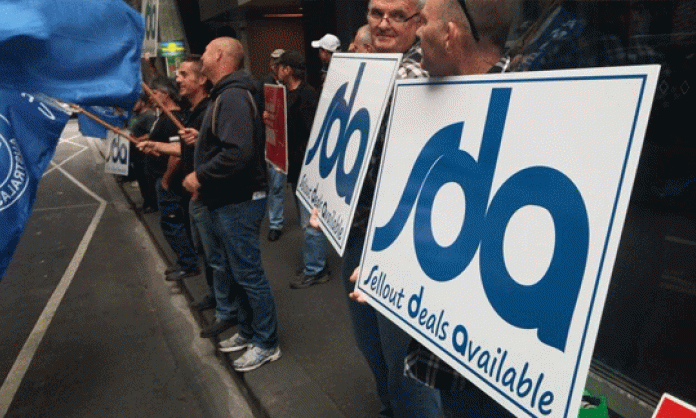Its noise belied its modest size. The crowd was an angry group of around 60 unionists gathered at the entrance to the national SDA (Shop, Distributive and Allied Employees Association) office in Melbourne’s CBD on 13 March. They were there to oppose a sell-out deal struck between the SDA, which covers retail workers, and Coles. The agreement will slash the conditions of Coles meatworkers. Protesters, members of SDA and the meatworkers’ union, say that supermarket workers should stick together to improve wages and conditions across the board.
Instead, the SDA has joined with Coles in a campaign against meatworkers and their union, the AMIEU (Australasian Meat Industry Employees Union). Despite high productivity rates and even higher profits, Coles wants to destroy the conditions and wages of meatworkers, a small and well-unionised section of its workforce. If the SDA-brokered deal goes ahead, penalty rates for meatworkers will be cut, many conditions lost and a tiered wage structure introduced. Some workers argue that Coles wants to drive them out entirely.
Dione has worked at Coles for 23 years and says they deserve their penalty rates: “We are giving up time with our families … as a single parent, working on a weekend means not only having to pay a babysitter, but also losing time with my daughter.”
But penalty rates are just part of the story. Chris talks about how Coles cuts everyone’s hours to avoid paying for rostered breaks. “We’re not asking for more but to keep what we have … what Coles is doing is an absolute disgrace”, he says.
Many meatworkers describe a feeling of being pushed out of a job. More and more meat comes into stores pre-cut and pre-packed. Butchering is increasingly moved off site. Graeme says that Coles is even having them train their replacements – “slicers” – young workers with little experience and low wages. “Big companies can wield a lot of power, and they know they have power”, he says. He thinks that the company is trying to drive out the remaining meatworkers to avoid paying them out.
As the protest marched from the SDA offices to a nearby Coles supermarket, Jane talked about broader politics. She’s not surprised that Coles is pushing so hard now: “The Liberals rule for businesses and the rich”, she says. “If Abbott had his way, there would be no penalty rates for anything.”
Predictions as to how the meatworkers’ fight will unfold are mixed. But morale is high. Sean, an AMIEU organiser, says that, along with those in Victoria, meatworkers in Queensland and New South Wales have taken strike action. However, if they are to defeat the proposed agreement, gaining support from Coles workers covered by the SDA is vital. These workers – the shelf stackers, bakers, checkout staff, storemen and trolley collectors – make up the vast majority of Coles’ workforce.
Where the meatworkers have been able to get the word out, Dione says that the response has been good. “We have support from most of the SDA members at Coles. Many didn’t know what was going on but were disgusted when they found out … we are reaching out to them.”
Unfortunately, the SDA fosters a conservatism and industrial passivity among its membership that makes the meatworkers’ task an an uphill battle. The road ahead will be tough, but a serious challenge to the sell-out deals of the SDA is long overdue.










